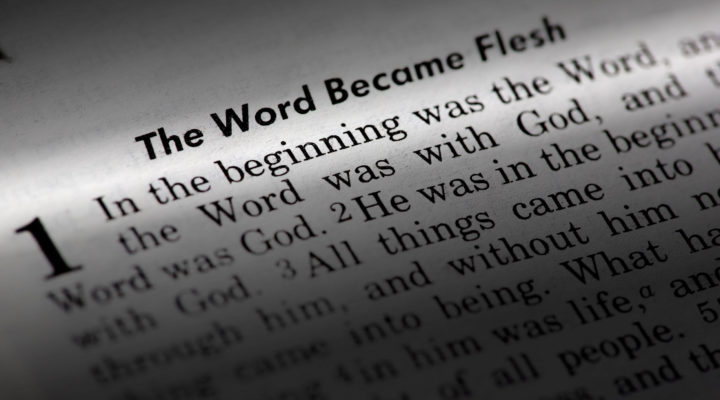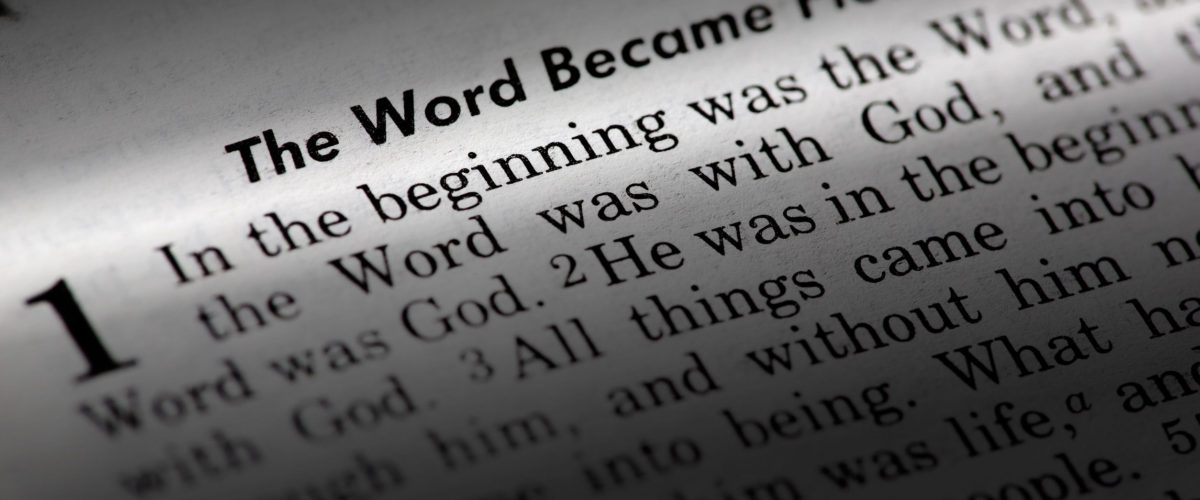Like many Christians, I strive to read the Bible every day. However, I admit frequent failures and that I’m not as diligent as in times past.
I remember the first time I set out to read the entire book from Genesis to Revelation. I was working the graveyard shift as a police dispatcher, and there usually was a lot of down time after 3:00 in the morning. I carried my Bible with me and read during those stretches and finished in a few months. When I was a pastor, I tried to read through the entire Bible every year, not always successfully.
I have given the Bible a lot of influence in my life, but not nearly as much as some. I don’t worship the Bible. Many Christians, or should I say “most” Christians, have the opinion that the Bible is the “Word of God.” Let me say up front; the Bible is not the Word of God.

Terry Austin
In the familiar opening words of the Gospel of John, the identification of Jesus as the Word of God is clearly laid out. “In the beginning was the Word, and the Word was with God, and the Word was God.” There is no way those words apply to a book. Later, John adds, “and the Word became flesh, and dwelt among us; and we saw his glory, glory as of the only Son from the Father, full of grace and truth.” Then he describes how John, the evangelist baptizing people in the wilderness, made it clear that Jesus is the Word of God.
When you read the Bible with this perspective, you will find that it makes much more sense. Every time you come across the phrase “Word of God” or “God’s Word,” substitute Jesus.
- Hebrews 4:12 — For the word of God (Jesus) is alive and active. Sharper than any double-edged sword, it penetrates even to dividing soul and spirit, joints and marrow; it judges the thoughts and attitudes of the heart.
- Psalm 119:105 — Your word (Jesus) is a lamp for my feet, a light on my path.
- Luke 11:28 — He replied, “Blessed rather are those who hear the word of God (Jesus) and obey it.”
- Psalm 33:4 — For the word of the Lord (Jesus) is right and true; he is faithful in all he does.
- James 1:21 — Therefore, get rid of all moral filth and the evil that is so prevalent and humbly accept the word (Jesus) planted in you, which can save you.
That raises the question: If the Bible is not the Word of God, what is the Bible?
“In the familiar opening words of the Gospel of John, the identification of Jesus as the Word of God is clearly laid out.”
Let me begin by saying the Bible makes Christianity (and Judaism) different from all other major religions of the world. Buddhism and Hinduism do not have sacred texts that guide their belief and actions. Islam has the Koran, but it is significantly different from the Bible. It was written by one man over a short period of time, 20 years in the seventh century. Mormonism uses the Bible along with the sacred Book of Mormon written by one man in the 19th century (although he claims the book was written much earlier and given to him).
Judaism and Christianity are similar when it comes to sacred writings. In fact, Christianity incorporates the writings of Judaism into its Bible as the Old Testament, to go along with the New Testament. However, the composition of both the Old and New Testaments is similar. They are both collections of material composed over a long period of time, written by a plethora of authors.
I don’t think any of the biblical writers thought they were writing God’s words. Instead, they were writing what they knew, what they heard, what they experienced about God. The Bible is a collection of words about God, not a collection of God’s words to us.
We don’t know who wrote down the words of Scripture. Historically, names have been ascribed to various books and portions, but we know they are inaccurate. For example, many people claim Moses wrote the first five books of the Old Testament —Genesis, Exodus, Leviticus, Numbers and Deuteronomy. It is hard for that to be true since a description of Moses’ death is contained in those writings. A few books of the Bible claim to have been written by a specific individual, others were named after a likely individual, and others are simply unknown.
The Bible was written by humans who took the occasion to put down on paper (or parchment or whatever they used at the time) their experiences with God. The experiences were varied for many reasons. They happened at different times to people with different personalities and interests. Sometimes they are consistent with one another, but often they are in conflict.
The early chapters of Genesis contain two versions of the creation stories. At different times, God instructs people to destroy all the enemy, and other times God tells them not to. It seems God wanted Saul to be the king, except when God didn’t intend for the nation to have a king. The list of inconsistencies found throughout the Bible is long. You find them even in the New Testament. After being baptized, Jesus spent 40 days in the wilderness being tempted by Satan, yet three days after his baptism, Jesus was at a wedding in Cana.
“There has to be a better way than trying to make the Bible into something it’s not.”
In order to keep the Bible from contradicting itself, scholars have used a lot of ink along with some creative reasoning to explain how these are not inconsistencies. They feel compelled to do this because to believe the Bible is God’s Word it must not contradict itself. God never would say one thing and then later say something else. Scholars have even arrived at the point of arguing that the Bible is without error in the “original documents,” which, of course, we don’t have and never will.
Whew, that was close. Now it’s OK if the Bible contradicts itself. We can blame the scribes who came along throughout history and made copies. Someone made a tiny mistake, and after being copied and recopied countless times, some mistakes became large. But that’s OK; God’s Word was perfect when given, humans messed it up.
Even if I accept that reasoning, how does that help me? If the Bible is God’s Word, but we no longer have large portions of that Word, it feels like we might be missing something important. I guess you could say that God made sure we preserved the important parts, but now you’re just guessing; there’s no way to know that.
There has to be a better way than trying to make the Bible into something it’s not. Rather than being God’s Word to humans, the Bible is human words about God. The Bible is a collection of writings produced over time by men (and probably not women, sadly). They recorded their experiences of God and what that taught them about God.
I’m not saying their writings are not different than any of the dozens of books I’ve written over the years. They are vastly different. Paul understood this when he wrote, “All Scripture is inspired by God and profitable for teaching, for reproof, for correction, for training in righteousness” (2 Timothy 3:16).
The phrase “inspired by God” is one word in the Greek language and means “God-breathed.” It means that Scripture is “God’s breath.” As the author was putting pen to paper, God was breathing on the process. It doesn’t say God dictated or spoke; God breathed. I’m not sure what that means or how much it impacted the final words, but it does make them special. Unlike anything you and I have ever produced.
A further consideration is that God’s people have agreed that these documents are unique and deserve special consideration over the centuries. History records the arduous task of finding a consensus of which writings were God-breathed and which were not. No one, not even me, is considering that any of my writing is God-breathed.
I think I’ve gone far enough that I can now explain what I believe about the Bible. It is a collection of men’s (again, it’s a shame we have no women) experiences with God and what it meant to them. As they gathered these experiences and the teaching passed down to them from others, it all was lumped together with community legends and folklore and put together with the breath of God. In other words, Scripture is not God’s word; it is men’s words about God.
All this material, woven together by God over the centuries, was further edited by the usage of people until church leaders eventually got together, debated, voted and declared, “this is the Bible.”
By the way, it is still being edited. When was the last time you took a deep dive into the Song of Solomon? How often do you read the book of Jude?
The next time you start to do something because you think it’s what the Bible says, stop and ask yourself, “Is this consistent with what I know about Jesus?” In other words, if my life shows little resemblance to how Jesus lived, then I might be listening to the wrong word of God.
Terry Austin says from his first day of life he was taught to love the church. He has lived out that passion in various ways as a pastor, church consultant, author and critic. He is currently a full-time writer and book publisher and actively engaged with house churches.
Related articles:
I knew the truth about women in the Bible, and I stayed silent | Opinion by Beth Allison Barr
Just because you believe the Bible ‘says it’ doesn’t ‘settle it’ | Opinion by Patrick Wilson
Are you sure the Bible actually says that? | Opinion by Russ Dean


